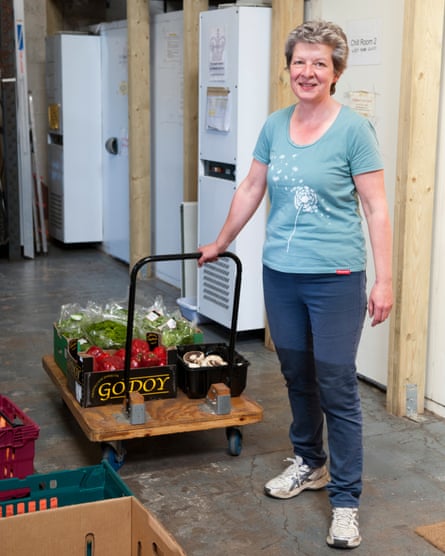Human Rights Watch (HRW) has accused the UK government of breaching its international duty to keep people from hunger by pursuing “cruel and harmful polices” with no regard for the impact on children living in poverty.
Examining family poverty in Hull, Cambridgeshire and Oxford, it concluded that tens of thousands of families do not have enough to eat. And it revealed that schools in Oxford are the latest to have turned to food banks to feed their pupils.
In a damning 115-page report that echoes previous expert condemnation of the UK’s policies on food poverty, the NGO – better known for documenting abuses from Myanmar to Haiti – said that the government was breaching its obligations under human rights law to ensure people have enough food.
Volunteers and staff at schools in Oxford confirmed that they were now reliant on donations, saying that teachers were noticing pupils who were missing meals at home and needed to be fed.

HRW said that ministers had “largely ignored growing evidence of a stark deterioration in the standard of living for the country’s poorest residents, including skyrocketing food bank use, and multiple reports from school officials that many more children are arriving at school hungry and unable to concentrate”.
The report will provide further ammunition to those who say that the government is failing in its duty to the poorest. It comes before Wednesday’s release of the final report on the UK by Philip Alston, the United Nations rapporteur on extreme poverty, who has already highlighted the same issues in his interim findings, following a two-week tour of the UK last November.
The report, which will appear on the eve of the European parliamentary elections, is likely to echo Alston’s warning last month that the political preoccupation with Brexit meant that issues like poverty are being ignored in a way that will leave the country “severely diminished”. Alston said: “You are really screwing yourselves royally for the future by producing a substandard workforce and children that are malnourished.”
The government dismissed the findings, saying that it was misleading to present them as representative of the whole country, and said it is helping parents back into work to reduce poverty and is ending the benefit freeze next year.

“Employment is at a record high and children growing up in working households are five times less likely to be in relative poverty,” a government spokesperson said. “We spend £95bn a year on working-age benefits and we’re supporting over 1 million of the country’s most disadvantaged children through free school meals.”
Pupils at Orchard Meadow and Pegasus primaries schools in the Blackbird Leys area of Oxford are among those receiving leftover fruit, vegetables, bread and dried goods from supermarkets and wholesalers delivered by the Oxford Food Bank, which aims to reduce food waste. It emerged last week that Sandwell Valley School in the West Midlands is using a food bank to deliver fresh produce to reduce the price of meals to pupils who might not otherwise afford them. The Labour leader, Jeremy Corbyn, also asked Theresa May at last week’s prime minister’s questions why a primary school in Great Yarmouth has set up its own food bank for hungry children.
Kartik Raj, the author of the HRW report, said growing hunger was “a troubling development in the world’s fifth largest economy”. He said: “Standing aside and relying on charities to pick up the pieces of its cruel and harmful policies is unacceptable. The UK government needs to take urgent and concerted action to ensure that its poorest residents aren’t forced to go hungry.”

Oxford Foodbank delivers to schools, community groups and homeless shelters and reuses a tonne of food a day that would otherwise have been dumped by wholesalers and retailers – including Marks and Spencer, Lidl and Waitrose – which donate it instead.
Chris Hearn, a retired firefighter and volunteer driver for the charity, said: “I think it is a shameful thing the state schools have to rely on charity to give their students plentiful and nutritious meals. It’s outrageous.”
At Orchard Meadow, dinner lady Thelma Trevis searched boxes of red peppers, mushrooms, bread, salad and a glut of beetroot for supplies.
“We have teachers coming up to us in the middle of the day and they say there is a child who hasn’t had breakfast, who hasn’t eaten since the previous evening,” she said. The cooks rely on the free produce to keep costs down and without the donations would not have enough vegetables, she said.
At Pegasus primary school, Rachel Wilding, whose job involves contacting pupils’ families, said the deliveries are used to feed children at breakfast and to try and teach parents how to cook better. Some is bagged up and offered to needy families to take home.
“We expect [the children] to go into the classroom and learn, but if you don’t have enough food in your stomach it is not not going to be a priority,” she said.
Another food drop was at the Peeple Centre, which helps families with children under five who are often referred by social services. Its workers bag up the food and take it to sessions with their users.
“People are hungry,” said Helen Stroudley, project manager for Peeple’s Oxfordshire deliveries. She cited high prices and the difficulty of keeping food if families are squeezed into temporary accommodation and lack fridge space.
Even working parents – including a mother and father who both work as nurses – need the food parcels they offer, she said.
The biggest taker was the O’Hanlon House homeless hostel in central Oxford where the chef makes 100 meals a day.
